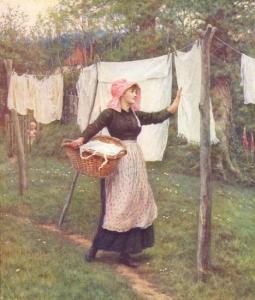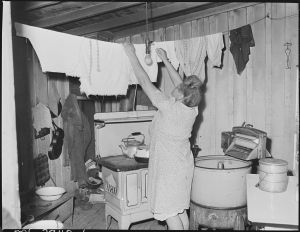Through the eyes of a child, the night rain seemed harsher, colder and somehow more threatening than the softer showers of the day. I was about ten years old and my job was to hold the flashlight for my mother while she hung out the clothes in the back garden. After a long day of housework she usually only got around to hanging out the washing in the late dark evenings after supper.
It was pitch black down there at nighttime, surrounded by tall trees and thick hedge. We could see the light from the kitchen window in the distance but it was too far away from us to be of any benefit. I had to shine the light down on the big basins in the grass so that my mother could see what clothes she picked out and then shine it up on the clothes line.
“Hold it steady, Marie. Shine it up on the clothes line and be still, good girl,” said my mother as she stretched her arms up and searched with her cold hands along the narrow line for more clothes pegs. It was raining as usual; my mother wore her old navy blue raincoat and head scarf. I stood close beside her, an umbrella in one hand and the flashlight in the other. Dozens of wet socks, and underwear, trousers, shirts and cardigans, there seemed to be no end to all the wet clothes in those big plastic basins and we hadn’t even taken the towels and sheets out yet.
My mother was the only person I ever knew who hung the washing out in the rain. She believed that the cold fresh rain would give the clothes a good rinsing during the night, but more importantly, it also relieved her from the daunting task of having to rinse out all the clothes in the little sink. A brilliant idea on her part I think; necessity is the mother of invention they say.
With thirteen people in our family and no washing machine, it was understandable that my mother always seemed to be in a constant state of laundry processing. It was a familiar sight to see buckets and basins full to the brim of socks and underwear soaking in Ariel by the kitchen door or on the back steps, while the towels and sheets soaked in the sink and in the old metal bath tub. She would only stop this daily, never ending job, to run and stir the stew cooking on top of the range or to clean and sweep the floors of the cottage or tend to the children. Of course, if a neighbor showed up at the door she would stop all her work and make a cup of tea and sit for a quick chat. She always made time for people who dropped by, making them feel welcome and important even though she knew that this set her work schedule back and that she would end up, yet again, having to hang out all the clothes in the dark.
I was afraid of the dark, being outside in the back garden at nighttime scared the wits out of me. The grunting and rustling sounds from the old hedgehog that lived in the bushes only added to my fear. When I reflect back, I think my mother was also afraid as she would always sing a song to me as she hung out the clothes, “Que Sera Sera” was her favorite and I sang along with her, dancing around in the wet grass to keep warm, my eyes darting from tree to tree, scanning the blackness and wishing I could just run back to the warmth of the cottage. The sweet smell of the burning peat and wood wafting in the damp air taunted and beckoned me inside
“Hurry up, Ma,” I whispered under my breath. Her cold hands continued to search in the darkness for the next wooden peg and on and on down the line she went: bending, reaching and pulling; bending reaching and pulling.
Finally, with the last of the clothes hung out, my mother pushed the two loaded lines up higher into the black night sky using the two long wooden poles for support. My father had made the poles from tall ash trees that he had carefully selected up in the woods.
She would turn to me as she gathered up the basins and say, “We’re all done now love, lets pray for a good day tomorrow!” A good day in my mother’s eyes was when the rain died down during the night and the cold sea breeze coming in from the east picked up quickly. She loved to see her clothes flying high in the forceful wind, flapping and folding into each other. She knew that the drier the clothes were coming in from outside, the less time they had to spend “airing “ on the little clothes line that hung under the mantelpiece of the old range, or on the backs of the kitchen chairs. With the old range being the only source of heat in the cottage, she didn’t want to have it covered and cluttered with clothes when we all came in from school, cold and tired. However, all the clothes had to be “aired” by the fire before she put them away in the clothes press.
The most challenging time of all was in the dead of winter when the heavy frost would settle in during the night and all the wet clothes hanging out on the clothes line were frozen stiff. It looked to me like an army of ghosts had taken over the back garden and there was very little we could do about it but to wait it out until it warmed up. You were flat out of luck if you needed some socks from the line that morning!
Growing up in Ireland, during the 1960s, was very tough, it was a time of great hardship with few material comforts; I didn’t know anyone on our road who owned a washing machine or a tumble dryer. Even though we lacked the material things, we were rich with an abundance of love and family unity and we were always assured of our mother’s loving presence and support. She was full of kindness, joy and laughter and I am very thankful for all the wonderful memories.
With such a large family, everyone had a job to do, the boys did most of the outdoor chores and we six girls did the inside jobs. We all helped each other out, whether it was setting the table, peeling the potatoes or washing the dishes, it was just an everyday part of life growing up in a large family.
Looking back, I wouldn’t trade one of those dark rainy nights with my mother for anything in the world.
Marie O’ Byrne.
Born and reared in Greystones, Co Wicklow.


